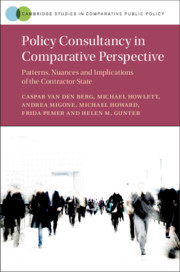 Policy Consultancy in Comparative Perspective
Policy Consultancy in Comparative Perspective Book contents
- Policy Consultancy in Comparative Perspective
- Cambridge Studies in Comparative Public Policy
- Policy Consultancy in Comparative Perspective
- Copyright page
- Contents
- Figures
- Tables
- Author Biographies
- Acknowledgements
- Abbreviations
- 1 Policy Consultancy in Comparative Perspective
- 2 Consultancy in the UK Government: Modernizing Privatism
- 3 Policy Consulting in the USA: Significant but in Decline?
- 4 Entrenched and Escalating: Policy-Relevant Consulting and Contracting in Australia, 1987–2017
- 5 From Corporatist to Contractor State? Policy Consulting in the Netherlands
- 6 Policy Consultants for Substance and Process: A Review of the Supply and Demand for Canadian Policy Consulting
- 7 Swedish Government Agencies’ Hiring of Policy Consultants: A Phenomenon of Increased Magnitude and Importance?
- 8 Conclusion: Policy Consulting in Comparative Perspective
- Book part
- References
- Index
- References
References
Published online by Cambridge University Press: 09 December 2019
- Policy Consultancy in Comparative Perspective
- Cambridge Studies in Comparative Public Policy
- Policy Consultancy in Comparative Perspective
- Copyright page
- Contents
- Figures
- Tables
- Author Biographies
- Acknowledgements
- Abbreviations
- 1 Policy Consultancy in Comparative Perspective
- 2 Consultancy in the UK Government: Modernizing Privatism
- 3 Policy Consulting in the USA: Significant but in Decline?
- 4 Entrenched and Escalating: Policy-Relevant Consulting and Contracting in Australia, 1987–2017
- 5 From Corporatist to Contractor State? Policy Consulting in the Netherlands
- 6 Policy Consultants for Substance and Process: A Review of the Supply and Demand for Canadian Policy Consulting
- 7 Swedish Government Agencies’ Hiring of Policy Consultants: A Phenomenon of Increased Magnitude and Importance?
- 8 Conclusion: Policy Consulting in Comparative Perspective
- Book part
- References
- Index
- References
- Type
- Chapter
- Information
- Policy Consultancy in Comparative PerspectivePatterns, Nuances and Implications of the Contractor State, pp. 266 - 299Publisher: Cambridge University PressPrint publication year: 2019
